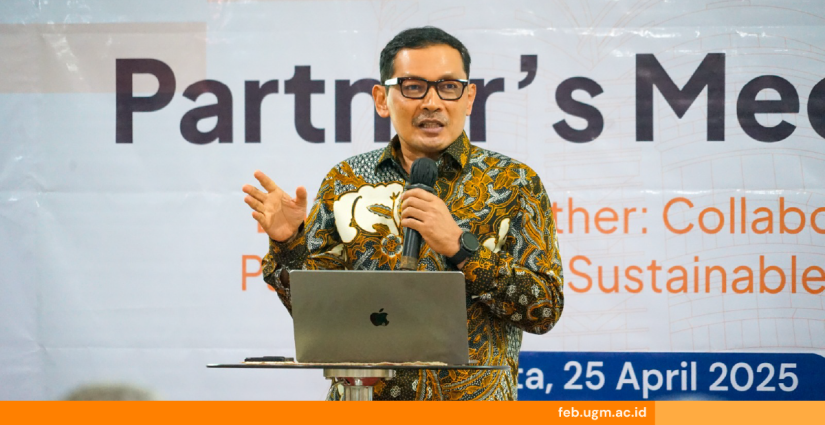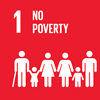
The financial services sector has proven to be a key pillar of Indonesia’s economic growth. It plays a crucial role in maintaining macroeconomic stability, channeling productive capital, expanding financial inclusion, and supporting sustainability agendas.
“In the context of global challenges such as geopolitical tensions, trade fragmentation, and divergent economic recoveries, the sector has shown remarkable resilience and adaptability,” explained Muhammad Edhie Purnawan, Ph.D., Member of the Board of Otoritas Jasa Keuangan/OJK, in his keynote speech at the FEB UGM Partners’ Meeting, Friday (April 25, 2025) at MM FEB UGM Jakarta Campus.
Edhie stated that in OJK’s report during the 2025 Annual Meeting of the Financial Services Industry, the sector was able to withstand pressure and served as a driving force of the national economy. In 2024, Indonesia’s economy grew by 5.03% amid global pressures, with the financial services sector as a significant support. Three key indicators reflect the sector’s resilience: the banking capital adequacy ratio (CAR) reached 26.69%, the loan-to-deposit ratio (LDR) remained within the 80–85% range, and the non-performing loan (NPL) ratio stayed stable at under 3%.
“The sector’s success was also evident during the COVID-19 pandemic. The credit restructuring program worth IDR 830 trillion for 6.6 million debtors, mostly MSMEs, is a tangible example of effective and adaptive policy response,” he added.
The financial sector’s intermediary function, Edhie continued, showed strong performance, with total bank lending reaching IDR 7,827 trillion, growing 10.39% year-on-year. Lending to productive sectors, particularly MSMEs, was highlighted in line with the government’s mandate to increase MSMEs’ contribution to GDP. Significant growth also occurred in the digital finance sector. Fintech peer-to-peer lending recorded an outstanding financing value of IDR 77.02 trillion (up 29.14%), while Buy Now Pay Later services reached IDR 28.94 trillion in transactions. On the other hand, the capital market successfully raised IDR 259.24 trillion through 199 public offerings throughout 2024, becoming an essential alternative financing source beyond banking.
Another noteworthy achievement was the national financial inclusion rate, which reached 85% in 2024, approaching the 90% target set for this year. Access to financial services expanded through digital platforms, such as mobile banking and fintech applications. However, Edhie emphasized the persistence of regional disparities, particularly between Java and Eastern Indonesia. For instance, financial inclusion in Java is 90%, but only 70% in Papua. Financial literacy also remains low, with only 38% of the population deeply understanding financial products.
“To address this, OJK needs to strengthen collaboration with the education sector and private institutions to design accessible and relevant financial literacy curricula,” he said.
On that occasion, Edhie also highlighted the role of the financial services sector in supporting the transition to a green economy. OJK encourages credit distribution for environmentally friendly projects like renewable energy and low-carbon transportation. In 2024, green financing reached IDR 150 trillion, dominated by the solar and hydro energy sectors. In addition, green and sustainability bond issuances significantly increased, amounting to IDR 50 trillion in 2024, indicating growing awareness of environmentally conscious investments. Launching the Indonesian Sustainable Finance Taxonomy (TKBI) and the Carbon Exchange also helped strengthen the green finance ecosystem, placing Indonesia in a strategic position in the fight against climate change.
Despite the accomplishments, Edhie noted several challenges the financial services sector must confront, including rising cybersecurity risks, the complexity of global geopolitics, regional disparities, and low financial literacy. He therefore stressed the importance of cross-sector collaboration as a sustainable solution.
“Collaboration among industry, academia, and government is key to overcoming these challenges,” he explained.
He provided examples, such as universities developing curricula based on fintech and sustainable finance. Meanwhile, the industry can invest in research and the development of innovative financial products. In addition, OJK must continue strengthening data-driven regulation to ensure the sector remains adaptive and inclusive.
Edhie added that the financial services sector must continue adapting to technological developments, strengthening ESG-based governance, and reaching underserved population segments. With a solid foundation and a clear vision, the sector will drive economic growth and position Indonesia more firmly on the global stage as an inclusive, sustainable, and resilient economy.
Report by: Kurnia Ekaptiningrum












